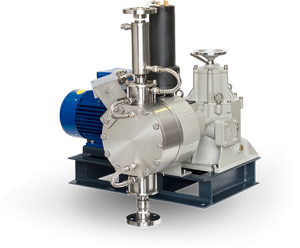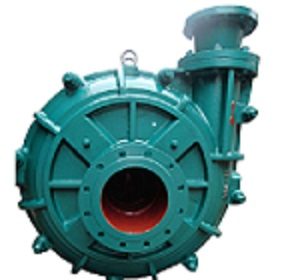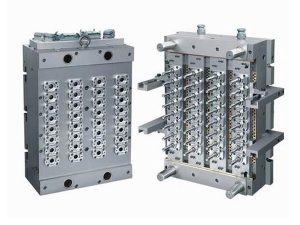Material Transfer Pumps
In order to transport chemicals, synthetic materials or various heavy liquids, Such as oils or sludge, etc., use an electro pump, known as a material transfer pumps. Some are also known as chemical transfer pumps because they are widely used in various chemical industries. But chemical transfer pumps are just one of many different types of Material Transfer Pumps.
Material transfer pumps are centrifugal pumps. Centrifugal pumps operate with a propeller. This propeller rotates the fluid at high speed. At the output of these impellers, a tool is used as a diffuser that breaks down the fluid velocity, which will greatly increase the fluid transfer rate or fluid pressure and increase the fluid flow.
Rotary impellers for pumps are usually requested by the buyer or user of the pump. These impellers, which play a major role in the velocity and transport of heavy liquids in these pumps, must be of sufficient sex and power to be selected for the type of fluid, which is why the variety of centrifugal pump impellers is very high.
Although mostlay chemical pumps are just one type of Material transfer pumps, we have said that they are generally called the chemical pump, but there are other types of Material transfer pumps that have similar structure but capabilities and durations they have are different.
These types of material transfer pumps, in addition to chemicals, can also be referred to as acidic pumps, polymeric pumps, or sludge or concentrated pumps. It is necessary to explain that the material transfer pump is sometimes referred to in some articles or descriptions as a high viscosity material transfer pump.
This is because most of the materials transported by these pumps have high concentrations or high contaminants.
Technical Specifications of Material Transfer Pump
Mainly pumps for material transfer are made of steel or polymer. The type of steel used in the manufacture of most centrifugal pumps or stainless steel material transfer pumps is made of thick sheets of type 304, which is highly resistant to scratches, as well as types of impact, corrosion and wear.
The stainless steel 304 is the best type of sheet material to produce a Material Transfer Pump, and not only does it look good, but it also has a durable structure and a long life for the pump.
Another type of material used to make a centrifugal pump for transfer materials is the material of polymer. Polymer is also highly resistant to all kinds of chemicals and acids. These polymers are mainly made of PP.PVC compounds, though some other types of polymers are also used to produce material transfer pumps.
Polymeric transfer pumps are usually used for lower concentrations of acidic or oily materials, but if used for the transport of sludge or solid materials such as in-mine transport, the type of stainless steel is better for the material transfer pump.
However, in both types of stainless steel pumps and polymer pumps, mainly the type of butterfly blade or butterfly type is more important and therefore it is better to be more careful in selecting the type of butterfly.
For example, for the transfer of solids with sharp and winning ingredients, such as the types of gravel or even sand, which greatly increases the rate of erosion and corrosion of the impeller, the use of high-grade, impeller-proof impellers is very important.
The greater the precision in selecting and purchasing a pump for transporting materials and with expert advice, the longer the pump life will be and the cost of maintenance will be drastically reduced.
Applications of Material Transfer Pump in Industry
Nowadays, Material Transfer Pump can be found in almost all industries. Material Transfer Pump are used today to transport oil and chemicals in the oil industry. It is also used in the mining, mosaic, chemical, hygienic, paper, alkali, automotive and steel industries, in the construction industry and many other industries.
Material Transfer Pump Used for high viscosity concentrated material transfer. Therefore, in all industries requiring heavy material transfer such as types of oils, acidic materials, corrosive materials, detergents, lubricants and alkalis, water combined with various pollutants, etc., the Material Transfer Pump is used for various applications.
Material transfer pumps must be selected in such a way that the fluid being transmitted does not cause damage to the pump body or components and therefore most of the pumps are either polymer or stainless steel. The polymer transfer pump uses a combination of PVC or, in particular, polyurethane to withstand high heat resistance for ultimate resistance.
Which Material Transfer Pump Is Better?
Polymeric transfer pumps have overcome their biggest disadvantage, heat and high heat, because they use PVC or polyurethane in their structure. But stainless steel material transfer pumps are not very responsive to acidic and corrosive materials even with all their good strength and structure and are not very resistant to this.
But the polymer transfer pump also does not withstand high temperatures and pressures. Although the use of PVC or polyurethane also allows the polymer material to pump up to 260 degrees Celsius, it is still better to use transfer materials with a final temperature of 60 degrees. Regarding the pressure-bearing capacity of polymeric pumps, they usually increase the thickness of the body or the polymer layer, which should also increase in thickness if the pressure is increased.
However, if you are looking to transport heavy, non-corrosive materials, the stainless steel pump seems to work best for you, but if you want to transport corrosive or acidic materials, you should use a polymeric pump. Of course, it is better to use polyurethane in the polymer structure, which is much better for both corrosion and wear and tear.
JTP or Jamin tarhe parsian industrial group, as one of the largest and most advanced companies producing various types of transfer material pumps, is ready to provide a wide range of different types of tarnsfer material pumps with different capabilities and capacities to its domestic and foreign customers. Customers of Jamin tarhe parsian company (JTP), can directly customize the material transfer pump by consulting with our experts on the type of industry and application required. By directly purchasing material transfer pump from this company, removing intermediaries and purchasing at affordable prices. Get the industry and application you want and get the highest return with highest quality.







